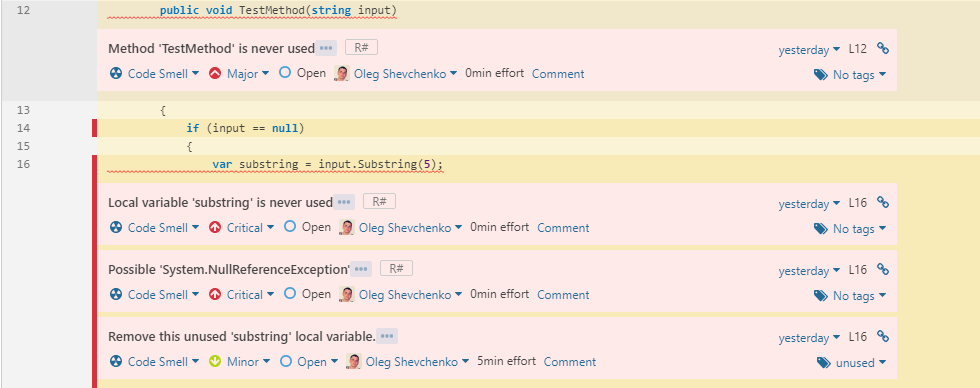Update 2019-08-04
If you are on self-hosted SonarQube server, you can consider using the plugin
In the latest version of SonarQube new fantastic feature was introduced, so-called external analyzers. The quote from the official site:
SonarQube 7.2 introduces a generic way to import issues found by 3rd-party analyzers. No need to jump from one tool to another, just benefit from a consolidated view in SonarQube. Even better: SonarQube has built-in support for some of the standard analyzers out there.
At the moment of writing, only TypeScript plugin has out of the box support of the feature. Fortunately, there is generic issue data format, which allows importing issues from any analyzer. ReSharper in its turn has a free command-line tool Inspect Code which can analyze projects and produce a report in XML format, so all we have to do is to convert ReSharper format to SonarQube format.
Generate ReSharper report part is simple, just run the Inspect Code tool against your solution:
InspectCode YouSolution.sln --swea -s=INFO -o=ReSharperReport.xml
For the next step, I wrote a small .NET core global tool which can convert ReSharper report to SonarQube format. First, you need to install dotnet-reqube with the following command.
dotnet tool install --global dotnet-reqube
and do the conversion:
dotnet-reqube -i ReSharperReport.xml -o SonarQubeReport.json -d YouSolutionDirectory
Then, you need to run Sonar Scanner as usual but with the additional parameter /d:sonar.externalIssuesReportPaths=SonarQubeReport.json where JSON file is the -o parameter that you pass to dotnet-reqube.
That’s it after the analysis is complete, you can see issues detected by ReSharper in SonarQube interface.

ReSharper issues will be marked with R# label.
Please note that external issues have some limitations:
- they cannot be managed within SonarQube; for instance, there is no ability to mark them False Positive.
- the activation of the rules that raise these issues cannot be managed within SonarQube. In fact, external rules are not visible in the Rules page or reflected in any Quality Profile.
I’ve created the example project with a Cake script which do all these steps automatically.
If you have any problems with the integration, please open an issue on GitHub.